By Ivan Naijuka
The relationship between the law and morality is emotive. Recently, I visited a friend whom I had taken some months without seeing. Meanwhile, what was meant to be a short visit turned into a long one because we discussed a lot.
We talked about politics, the Church and ended up talking about law and morality. We agreed that the state of our nation is as a result of the separation of the two – law and morality.
When we hear the ‘mafi a’ talks among our trusted leaders and the unending political and economic fi ghts, you wonder whether we have and observe morals as a country. The law must be built on the foundations of morality. I have seen people swear by the Bible and lie in courts of law.
If telling the truth was a value, you would not need to first swear. “The state is founded on the minds of its citizens who are moral agents,” says Prof R.N. Gilchrist. “…. a bad people means a bad state and bad laws.” While law is a course of study and also a subject in political science, morality is the subject matter of ethics. However, there is a close similarity between the two.
Law is essentially a set of rules and principles created and enforced by the state, whereas morals are a set of beliefs, values and principles and behavioural standards which are enforced and created by society.
Law and morality are intimately related and complement each other. Laws are generally based on the moral principles of society. Both regulate the conduct of the individual in society. They influence each other to a great extent.
Laws, to be effective, must represent the moral ideas of the people. But good laws sometimes serve to rouse the moral conscience of the people and create and maintain such conditions as may encourage the growth of morality.
The laws of a state, thus, conform to the prevailing standard of morality. Morality is the basis of ideal laws. If the state operates through ideal laws which are based on morality, it will help the emergence of an ideal state.
There is a marked distinction between law and morality. The law regulates and controls the external human conduct. It is not concerned with inner motives.
A person may be having an evil intention in his or her mind, but the law does not care for it. The law will apply only when this evil intention is translated into action and some harm is actually done. Law is universal in a particular society.
All the individuals are equally subjected to it. It does not change from person to person. Morality regulates and controls both the inner motives and the external actions.
It is concerned with the whole life of a person. The law is, thus, limited as compared with morality because the former is simply
concerned with external actions.
Morality condemns a person if they have some evil intentions, but laws are not applicable unless these intentions are manifested externally. Morality is variable. It changes from one person to another, and from age to age. Every person has their own moral principles.
Moral laws lack precision and assurance as there is no authority to make and enforce them. In the end, we can say that morality cannot be thrust upon the state.
And it is also clear the law cannot cover all the ground of morality. All said, the onus is on us to observe both if we must live in a harmonious society as Christians.
But Psalm 11:3 challenges us: “The foundations of law and order have collapsed. What can the righteous do?”






















